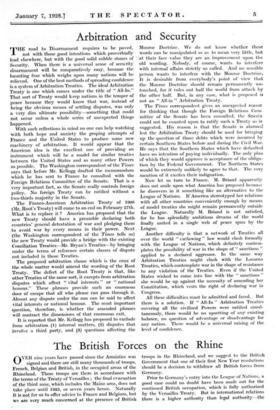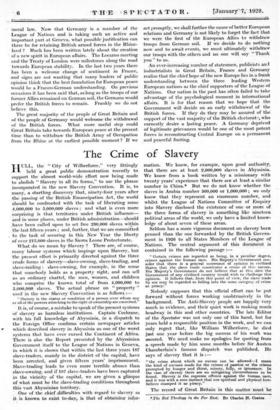The British Forces on the Rhine
OVER nine years have passed since the Armistice was signed and there are still many thousands of troops, French, Belgian and British, in the occupied areas of the Rhineland. These troops are there in accordance with the terms of the Treaty of Versailles ; the final evacuation of the third zone, which includes the Mainz area, does not take place until 1935, or seven years hence. Naturally it is not for us to offer advice to France and Belgium, but we are very much concerned at the presence of British troops in the Rhineland, and we suggest to the British Government that one of their first New Year resolutions should be a decision to withdraw all British forces from Germany.
Prior to Germany's entry into the League of Nations, a good case could no doubt have been made out for the continued British occupation, which is fully authorized by the Versailles Treaty. But in international relations there is a higher authority than legal authority—the moral law. Now that Germany is a member of the League of Nations and is taking such an active and important part at Geneva, what possible justification can there be for retaining British armed forces in the Rhine- land ? Much has been written lately about the creation of a new spirit in European affairs. The Locarno meeting and the Treaty of London were milestones along the road towards European stability. In the last two years there has been a welcome change of sentiment in France, and signs are not wanting that many leaders of public opinion think that the best foundation for European peace would be a Franco-German understanding. On previoui occasions it has been said that, as long as the troops of our former Allies remained on German soil, the Germans would prefer the British forces to remain. Frankly we do not believe this.
The great majority of the people of Great Britain and of the people of Germany would welcome the withdrawal of the British forces. What more useful step could Great Britain take towards European peace at the present time than to withdraw the British Army of Occupation from the Rhine at the earliest possible moment ? If we act promptly, we shall further the cause of better European relations and Germany is not likely to forget the fact that we were the first of the European Allies to withdraw troops from German soil. If we decide to do nothing now and to await events, we must ultimately withdraw our troops with the others and no one will say " Thank you " to us.
An ever-increasing number of statesmen, publicists and industrialists in Great Britain, France and Germany realize that the chief hope of the new Europe lies in a frank understanding between the three leading Western European nations as the chief supporters of the League of Nations. Our nation in the past has often failed to take advantage of the psychological moment in international affairs. It is for that reason that we hope that the Government will decide on an early withdrawal of the British forces. If they do they may be assured of the support of the vast majority of the British electorat', who earnestly desire a lasting peace. A Germany deprived of legitimate grievances would be one of the most potent forces in reconstructing Central Europe on a permanent and peaceful footing.







































 Previous page
Previous page